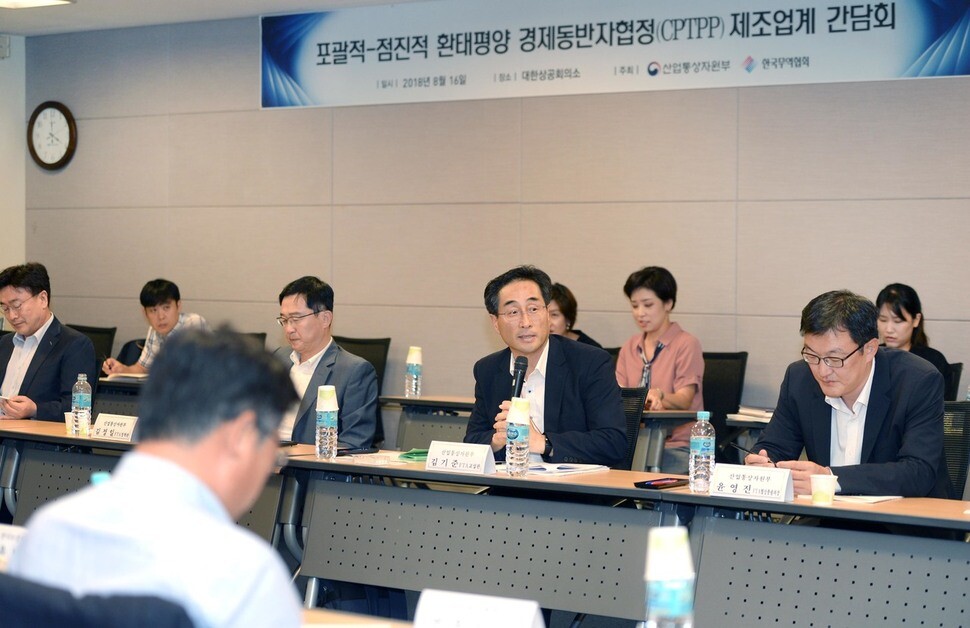hankyoreh
Links to other country sites 다른 나라 사이트 링크
South Korean government consults with various industries about its accession to CPTPP

The South Korean government has organized meetings with various industries prior to its final decision about accession to the Comprehensive and Progressive Agreement for Trans-Pacific Partnership (CPTPP).
In October, the government is expected to finalize its decision to join the CPTPP during a meeting of the trade promotion committees of related ministries and the Ministerial Meeting on International Economic Affairs, which is attended by officials from the Ministry of Economy and Finance; the Office of the Minister of Trade; the Ministry of Foreign Affairs; the Ministry of Agriculture, Food and Rural Affairs; and the Ministry of Oceans and Fisheries.
On Aug. 16, the Office of the Minister of Trade held a meeting for CPTPP manufacturing industries at the Korea Chamber of Commerce and Industry, in downtown Seoul, to solicit stakeholders’ opinions. The meeting was attended by representatives from 17 associations and organizations representing industries including automobiles, shipbuilding, steel and petrochemicals.
The CPTPP is a free trade and economic integration pact for the Asia-Pacific region that 11 countries – including Japan, Australia, Canada and Mexico – signed this past March after the US withdrew from the previous Trans-Pacific Partnership (TPP) shortly after the inauguration of Donald Trump as US president. Currently, each of these 11 countries are in the process of ratifying the agreement to make it official.
Since settling on acceding to the CPTPP, the Office of the Minister of Trade appears to be hurrying to complete the preliminary steps mandated by the Act on the Conclusion Procedure and Implementation of Commercial Treaties, including holding meetings for each industry.
“The timing of our internal decision to join the CPTPP is important, too. An earlier time frame could work in our favor [during more negotiations about accession with the current 11 members],” said a senior official involved with trade.
Given recent trends among CPTPP member states, the report that will be presented to the National Assembly after the accession decision is made, and the controversy and conflict that are expected to ensue, it would appear to be in South Korea’s interest to make its decision quickly, by the end of October at the latest.
If South Korea does finalize its participation in the deal, it will be five years after officials voted to express interest during the Ministerial Meeting on International Economic Affairs in Oct. 2013. Since the CPTPP advocates market liberalization at a level higher than any other free trade agreement in the world, South Korean involvement could severely harm the agriculture and fishery industries. Considering that the CPTPP would basically represent a free trade agreement with Japan, concerns have also been raised that this would further exacerbate South Korea’s already chronically adverse balance of trade with Japan
The 11 members of the CPTPP are planning to hold a plenary session in October or November to discuss the guidelines that will be applied in additional negotiations with other countries seeking to join the agreement. But these additional accession negotiations are likely to take place after the agreement becomes official. The CPTPP takes effect 60 days after at least six of the member states have completed their domestic ratification process. This means that the agreement is expected to take effect around next February.
On the assumption that the US might rejoin the CPTPP, the South Korean government has been keeping a close eye on US movements as part of its strategy of hopping aboard the agreement alongside the US. But despite initial expectations, the US has yet to finish renegotiating the North American Free Trade Agreement (NAFTA) with Canada and Mexico, both of which are members of the CPTPP, and it is also concentrating on a strategy of reaching a bilateral free trade agreement with Japan, which has been spearheading the CPTPP.
By Cho Kye-wan, Tokyo correspondent
Please direct comments or questions to [english@hani.co.kr]

Editorial・opinion
![[Guest essay] Preventing Korean Peninsula from becoming front line of new cold war [Guest essay] Preventing Korean Peninsula from becoming front line of new cold war](https://flexible.img.hani.co.kr/flexible/normal/500/300/imgdb/original/2024/0507/7217150679227807.jpg) [Guest essay] Preventing Korean Peninsula from becoming front line of new cold war
[Guest essay] Preventing Korean Peninsula from becoming front line of new cold war![[Column] The state is back — but is it in business? [Column] The state is back — but is it in business?](https://flexible.img.hani.co.kr/flexible/normal/500/300/imgdb/original/2024/0506/8217149564092725.jpg) [Column] The state is back — but is it in business?
[Column] The state is back — but is it in business?- [Column] Life on our Trisolaris
- [Editorial] Penalties for airing allegations against Korea’s first lady endanger free press
- [Editorial] Yoon must halt procurement of SM-3 interceptor missiles
- [Guest essay] Maybe Korea’s rapid population decline is an opportunity, not a crisis
- [Column] Can Yoon steer diplomacy with Russia, China back on track?
- [Column] Season 2 of special prosecutor probe may be coming to Korea soon
- [Column] Park Geun-hye déjà vu in Yoon Suk-yeol
- [Editorial] New weight of N. Korea’s nuclear threats makes dialogue all the more urgent
Most viewed articles
- 1[Guest essay] Preventing Korean Peninsula from becoming front line of new cold war
- 2Yoon’s broken-compass diplomacy is steering Korea into serving US, Japanese interests
- 360% of young Koreans see no need to have kids after marriage
- 4[Reporter’s notebook] In Min’s world, she’s the artist — and NewJeans is her art
- 5After 2 years in office, Yoon’s promises of fairness, common sense ring hollow
- 6S. Korean first lady likely to face questioning by prosecutors over Dior handbag scandal
- 7[Column] Why Korea’s hard right is fated to lose
- 8AI is catching up with humans at a ‘shocking’ rate
- 9[Column] The first year of war in Ukraine
- 10‘Weddingflation’ breaks the bank for Korean couples-to-be